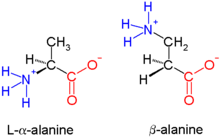
Beta-peptides (β-peptides) are peptides derived from β-amino acids, in which the amino group is attached to the β-carbon (i.e. the carbon two atoms away from the carboxylate group). The parent β-amino acid is β-alanine (H2NCH2CH2CO2H), a common natural substance, but most examples feature substituents in place of one or more C-H bonds. β-peptides usually do not occur in nature. β-peptide-based antibiotics are being explored as ways of evading antibiotic resistance.[1] Early studies in this field were published in 1996 by the group of Dieter Seebach[1] and that of Samuel Gellman.[2]
- ^ a b Seebach D, Overhand M, Kühnle FNM, Martinoni B, Oberer L, Hommel U, Widmer H (June 1996). "β-Peptides: Synthesis by Arndt-Eistert homologation with concomitant peptide coupling. Structure determination by NMR and CD spectroscopy and by X-ray crystallography. Helical secondary structure of a -hexapeptide in solution and its stability towards pepsin". Helvetica Chimica Acta. 79 (4): 913–941. doi:10.1002/hlca.19960790402.
- ^ Appella DH, Christianson LA, Karle IL, Powell DR, Gellman SH (1996). "β-Peptide Foldamers: Robust Helix Formation in a New Family of -Amino Acid Oligomers". J. Am. Chem. Soc. 118 (51): 13071–2. doi:10.1021/ja963290l.